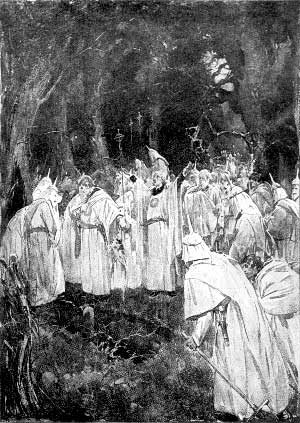talking history | syllabi | students | teachers | puzzle | about us
“Dedicated to the men of the South who suffered exile, imprisonment and death for the daring service they rendered our country as citizens of the Invisible Empire.”
Started by Confederate veterans in 1866 and led by prominent planters, the Ku Klux Klan grew quickly during Radical Reconstruction. Hooded Klansmen terrorized individuals and freedpeoples organizations, breaking up meetings, shooting and lynching Union League leaders, and driving people away from the polls across the South. In its nighttime whippings, killings, and rapes, the Klan targeted freedpeople who showed signs of independence, such as those who bought or rented their own land, or community leaders, such as teachers. The criminal, terrorist nature of the organization was later glossed over. By the turn of the century, popular novels like Thomas Dixon, Jr.’s The Traitor, published in 1907, transformed the bloody record of the Ku Klux Klan (here softened by the euphemism “Invisible Empire”) into tales of gallantry, sacrifice, and latter-day knighthood.

Source: (L. D. Williams) Thomas Dixon, Jr., The Traitor: A Story of the Fall of the Invisible Empire (1907)—American Social History Project.
